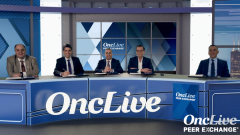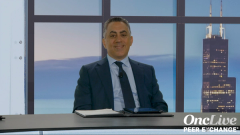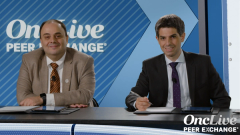
Selecting Therapy for Advanced HCC Following TKI Failure
Shared insight on which factors help to inform selection of second-line therapy for patients with advanced HCC following lenvatinib failure.
Episodes in this series

Transcript:
Tanios Bekaii-Saab, MD: Anthony, lenvatinib looked at in [the] first line. The problem is [that] most of the studies we have on hand in [the] second line have been in the setting of sorafenib. Can we extrapolate thinking whatever TKI [tyrosine kinase inhibitor] you've used in the second line you can just—
Anthony El-Khoueiry, MD: So you're referring to most of the second line studies having been?
Tanios Bekaii-Saab, MD: If not all, all the second lines.
Anthony El-Khoueiry, MD: Post sorafenib, not post lenvatinib.
Tanios Bekaii-Saab, MD: They were post sorafenib, not post lenvatinib.
Anthony El-Khoueiry, MD: We have to extrapolate because these are the agents we have available, so this is what's at our disposal. If we look at the nuances of the studies, the cabozantinib study allowed up to 2 prior lines of therapy, so those patients had sorafenib, but a third of them had something else as well, and cabozantinib was still active compared with placebo, so to me, that's reassuring. The regorafenib study had some particularities about it, saying that patients must have tolerated sorafenib at a dose of 400 [milligrams] for 20 of the last 28 days, so there were some conditions around it. Does that affect the activity of regorafenib? Does this mean regorafenib would not be active post lenvatinib? Probably not, but that trial was designed as a post-sorafenib study. The short answer is yes; we're extrapolating because we have no choice, but in real-world data, clearly these TKIs have activity post lenvatinib as well.
Tanios Bekaii-Saab, MD: Pierre, do we know that? When I look at sorafenib and lenvatinib there are some similarities in the kinomes and some less relevant similarities. I see lenvatinib as a potent VEGF inhibitor—a little of EFGR and not much of everything else, and sorafenib a little bit of everything.
Pierre Gholam, MD: From an MOA [mechanism of action] perspective, they're different. They're TKIs that have different targets. Sorafenib has a much more diversified and wide range of targets, and lenvatinib is vascular pathway driven, which reflects the AE [adverse event] profile, which these drugs cause. I tend to be a purist when it comes to lines of therapy. I do not like to have a line zero with lenvatinib and then reinvent the wheel and start with atezo/bev [atezolizumab bevacizumab], etcetera. Maybe that's just my own bias for how the studies were designed and how we should be using drugs, but that would be my preference. Within those conditions, if the patient progresses on lenvatinib, and I can control hypertension effectively, I don't want to have the patient have grade 4 hypertension; cabozantinib would be a reasonable option for that patient. Ramucirumab, certainly [when] the patient's AFP [alpha-fetoprotein] is much greater than 400, that would potentially be an option too. My personal experience with REMS [risk evaluation mitigation strategies] is limited, and my experience with cabozantinib is more extensive, so I think it would be a reasonable option given its efficacy in patients who have undergone multiple lines of therapy. That would be my go-to.
Tanios Bekaii-Saab, MD: It's interesting, I know the renal cell cancer world is much more advanced in terms of utilization of these agents, and I was always intrigued by that preclinical study that I’m sure you know about that looked at cabozantinib post sunitinib, which underperforms in liver [cancer]. It does target a couple of kinases, MET and AXL, which seem to be main drivers of VEGF resistance. Now it's preclinical, I'm not sure how without having a prospective study, but I do agree. In my practice that would be the preferred regimen. I'd be more reluctant to use ramucirumab in a patient who has seen lenvatinib because I'm thinking very potent VEGF, pure VEGF inhibitor; maybe less. I want something a little dirtier and a little bit more targeted.
Mark Yarchoan, MD: I'm just going to clarify because I was the one who brought up ramucirumab initially. I think the data for cabozantinib is very compelling, and it's always hard to tease apart when someone discontinues lenvatinib: did they really not tolerate the TKI? it’s hard to tell from this.
Tanios Bekaii-Saab, MD: Ramucirumab is a reasonable option if you're reluctant to use TKIs. I would agree that if we start running out of options, we're going to use all the options we have on that.
Pierre Gholam, MD: Just to recap what Anthony mentioned earlier, if the patient had a reasonable course of therapy with sorafenib in the first line and met that test of tolerance—which is the greater than at least 400 milligrams for 20 out of the last 28 days—regorafenib might be an option. If you look at that sweet spot, that small subset of patients who fall in that category, you could have durable responses, sometimes at the median up to over 20 months. In that small subset of patients, assuming the patients started sorafenib and did well on it for a long time, it may not be an unreasonable option, but for most patients these days who typically start with lenvatinib, I find cabozantinib to be a natural succession.
Tanios Bekaii-Saab, MD: I would agree.
Transcript edited for clarity.








































